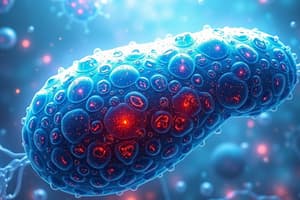Podcast
Questions and Answers
What is the effect of insulin on lipolysis in adipose tissue?
What is the effect of insulin on lipolysis in adipose tissue?
- Inhibits (correct)
- Increases glucagon secretion
- Has no effect
- Stimulates
Which hormone stimulates fatty acid oxidation in muscle and liver?
Which hormone stimulates fatty acid oxidation in muscle and liver?
- Leptin
- Glucagon
- Adiponectin (correct)
- Insulin
What is the effect of thyroid hormones on lipoprotein metabolism?
What is the effect of thyroid hormones on lipoprotein metabolism?
- Increase apoC-III, an inhibitor of lipoprotein lipase
- Increase apoA-I, a component of HDL (correct)
- Inhibit lipoprotein lipase activity
- Reduce triglyceride clearance from the bloodstream
What is the effect of glucagon on adipose tissue?
What is the effect of glucagon on adipose tissue?
What is the effect of leptin on energy expenditure?
What is the effect of leptin on energy expenditure?
What is the effect of glucocorticoids on lipoprotein metabolism?
What is the effect of glucocorticoids on lipoprotein metabolism?
Flashcards are hidden until you start studying
Study Notes
Hormonal Regulation of Lipid Metabolism
Insulin:
- Stimulates lipogenesis (fat synthesis) in adipose tissue
- Inhibits lipolysis (fat breakdown) in adipose tissue
- Promotes glucose uptake in adipose tissue, which is converted to glycerol for triglyceride synthesis
Glucagon:
- Inhibits lipogenesis (fat synthesis) in adipose tissue
- Stimulates lipolysis (fat breakdown) in adipose tissue
- Releases glycerol from adipose tissue, which is then used for gluconeogenesis in the liver
Thyroid Hormones:
- Stimulate lipolysis (fat breakdown) in adipose tissue
- Increase lipoprotein lipase activity, enhancing triglyceride clearance from the bloodstream
Adiponectin:
- Produced by adipose tissue
- Stimulates fatty acid oxidation in muscle and liver
- Inhibits glucose production in liver
Leptin:
- Produced by adipose tissue
- Inhibits appetite and increases energy expenditure
- Stimulates lipolysis (fat breakdown) in adipose tissue
Hormonal Regulation of Lipoprotein Metabolism
Insulin:
- Inhibits apoC-III, an inhibitor of lipoprotein lipase
- Increases lipoprotein lipase activity, enhancing triglyceride clearance from the bloodstream
Thyroid Hormones:
- Increase apoA-I, a component of HDL
- Increase LCAT activity, enhancing cholesterol esterification in HDL
Glucocorticoids:
- Stimulate VLDL production in the liver
- Inhibit lipoprotein lipase activity, reducing triglyceride clearance from the bloodstream
Hormonal Regulation of Lipid Metabolism
- Insulin stimulates lipogenesis in adipose tissue, promoting fat synthesis and inhibiting lipolysis, or fat breakdown.
- Insulin also promotes glucose uptake in adipose tissue, which is converted to glycerol for triglyceride synthesis.
- Glucagon has the opposite effect, inhibiting lipogenesis and stimulating lipolysis, releasing glycerol from adipose tissue for gluconeogenesis in the liver.
- Thyroid hormones stimulate lipolysis in adipose tissue and increase lipoprotein lipase activity, enhancing triglyceride clearance from the bloodstream.
- Adiponectin, produced by adipose tissue, stimulates fatty acid oxidation in muscle and liver, while inhibiting glucose production in the liver.
- Leptin, also produced by adipose tissue, inhibits appetite and increases energy expenditure, while stimulating lipolysis in adipose tissue.
Hormonal Regulation of Lipoprotein Metabolism
- Insulin inhibits apoC-III, an inhibitor of lipoprotein lipase, and increases lipoprotein lipase activity, enhancing triglyceride clearance from the bloodstream.
- Thyroid hormones increase apoA-I, a component of HDL, and LCAT activity, enhancing cholesterol esterification in HDL.
- Glucocorticoids stimulate VLDL production in the liver and inhibit lipoprotein lipase activity, reducing triglyceride clearance from the bloodstream.
Studying That Suits You
Use AI to generate personalized quizzes and flashcards to suit your learning preferences.





